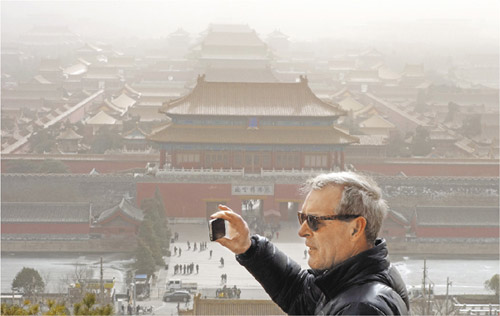|
查看原文
As a thick smog hung over Beijing last year, Stephanie Giambruno and her husband decided it was time for her and their two girls to return to the United States.
Giambruno's husband stayed in China for his job as general manager of a global technology company. He now Skypes with the family twice a day and lives with "constant jet lag" as he travels to Florida once a month to see them, she says.
While it's hard to be apart, Giambruno says Beijing's record air pollution left them no choice. She saw friends' children develop asthma. Their own daughters, at age six and 21 months, were often forced to remain indoors.
"It's not a way to live, to keep your baby inside with an air filter running," she said.
As bad air chokes Chinese cities, some expatriate employees are starting to leave families in their home countries, the latest sign of pollution's rising cost to the more than half a million foreigners working in China and the multinationals seeking to retain them. Smog in Beijing was worse than government standards most days last year, and environment ministry statistics show that 71 of 74 Chinese cities failed to meet air-quality standards.
"We are seeing some companies reverting to 1980s and 1990s hardship packages for executive-level candidates in cities that are hard hit with pollution," said Angie Eagan, managing director for China at the recruitment firm MRIC. "These packages are shaped around executives leaving their families in their home country and receiving an allowance for frequent home trips."
The World Health Organisation said in March that air pollution contributed to seven million deaths worldwide in 2012, with 40 per cent of those coming from the region dominated by China under the WHO's classification system. Outdoor air pollution can cause lung cancer, a WHO agency said last year, ranking it as a carcinogen for the first time.
Panasonic of Japan is considering increasing a living allowance for overseas workers in China by an undisclosed amount based on environmental factors, including air pollution.
Some companies remain reluctant to add to the 5 percent to 10 percent premium they already pay foreign employees in China, preferring to compensate them for pollution through perks such as more time off, paid trips to get away or covering the cost of insulating homes, said Fred Schlomann, managing director at human resources firm AIRINC.
A third of European Union Chamber of Commerce companies in China said air pollution had added to human-resource costs as expats made demands such as better pay and health care, as well as air filters, according to Ioana Kraft, general manager of the chamber's Shanghai chapter.
Two-thirds of the companies identified air quality as the top challenge in attracting foreign talent. Some 48 per cent of respondents to a survey this year by the American Chamber of Commerce for Beijing and Northeastern China said they had difficulties recruiting or retaining senior executives in China because of pollution.
James McGregor, Greater China chairman of consultancy Apco, is moving to Shanghai in May after being in Beijing for 25 years and says his wife spends more time in Minnesota in the US Midwest now, partly because of pollution. To provide a clean workplace, his firm installed air filters every 7.6 metres in its Beijing office, about a dozen devices for 30 staff. Even so, employees need more medical leave than 18 months ago.
"There are a lot of sick days, and sometimes our office in Beijing sounds like tuberculosis wards," said McGregor, 60. "People in our office are complaining they don't feel well, they don't have energy."
Levels of PM2.5, the tiny particles posing the greatest risk to human health, were stuck at hazardous levels for a week this year in Beijing and in 2013 peaked at 35 times the WHO's recommended limit. McGregor's firm is able to retain staff because it mostly hires locally. Even so, some clients have said that it's harder luring new talent.
"We're starting to see families not come," McGregor said. "In some cases, people are coming without their families and they are cutting a deal to go home more often."
Shane McNamara, an American executive who runs a 15-person interior design and construction company in China with his wife, said she may move her home base to Hong Kong because of the pollution. His wife, who is Chinese, has reduced work travel because of the bad air, he said.
While McNamara said he would stay on the mainland for business, he has his own health concerns. At his annual check-up at the Mayo Clinic in the US, the doctor told him that "absolutely with that kind of pollution his health would be impacted".
WHO director general Dr Margaret Chan Fung Fu-chun said in a March interview that "talented people have actually talked to me, and they've changed their decision to settle in China because of the air pollution". But, she said, "I think Chinese authorities understand this and they know what's going on."
Simon Gleave, Beijing-based partner in charge of KPMG's Asia-Pacific financial services practice, has spent US$4,000 for an air-quality monitor, US$15,000 for air filters around the house and has an indoor virtual-reality biking system for days when the air is too bad for him to cycle outside.
"If my daughter develops any health effects, though, we would leave immediately," said Gleave, who has lived in Beijing for more than a decade.
Chinese Premier Li Keqiang has called pollution a major problem and said the government would declare war on smog by removing high-emission cars from the road and closing coal-fired furnaces.
Almost two-thirds of the country's wealthy, those with assets of US$1.6 million or more, have left or plan to leave the country, according to the Hurun Report, a Shanghai-based research firm that tracks the country's rich. Environmental concerns are one of their most frequently cited reasons, according to Kristin Shi-Kupfer, who researches Chinese society at the Berlin-based Mercator Institute for China Studies.
Companies from Nestle to Japan's Sony are handing out masks to employees in China. Some are lining their offices with air filters, or hiring experts to coach executives on battling smog. Qoros Auto, a joint venture between an Israeli company and China's Chery Automobile, said it spent about 150,000 yuan (HK$188,000) for purifiers at its offices and 9,750 yuan on masks for employees.
Chris Buckley, a distributor of the Blueair brand of purifiers in Beijing, says corporate demand for air purifiers has doubled over the past year. Company orders could be in the range of US$100,000 to fit out a two-floor office, while mid- to upper-level corporate executives can get allowances of about 15,000 yuan to 20,000 yuan to offset costs of their home purifiers, he said.
Gordon Peters, a doctor who spent more than 30 years in the US Air Force and is now the Beijing-based North Asia medical director for risk advisory firm International SOS, says more corporations are hosting seminars on air pollution protection.
He lectures on checking pollution apps before leaving the house, which face masks to wear (N95 are best, as they block 95 per cent of pollutants), the importance of air purifiers and how to seal windows and doors.
While pollution is seen as a hindrance, companies are still able to attract expats because deep knowledge of the China market is becoming crucial to career and business advancement.
Robert Parkinson from the UK, who owns a 40-person executive search firm in Beijing, just spent more than US$6,000 on two purifiers for his office. While he acknowledges the pressures from pollution, he doesn't see it as a reason to leave because China offers advantages such as career experience, cultural exposure and good expat benefits.
Giambruno, who moved with her girls to Florida, is grateful for the clean air they now have. While the distance and global commute weigh on her and her husband, "that's where his job is right now, and he's got a great job and works for a great company", she said, though she declined to offer specifics of his job.
Even as Giambruno recalls things she loved about Beijing, where she worked as a freelance television producer, she also remembers outings that were cancelled when pollution spiked and smog so thick one January day that she thought she could touch it. She now appreciates Florida's blue skies.
"Every time I walk outside with the girls, I say 'breathe in,' because it's the most amazing smell: fresh air."
|
查看譯文
據(jù)《南華早報》報道,去年����,當(dāng)北京被嚴(yán)重霧霾籠罩之時,在北京居住斯蒂芬妮和她的丈夫決定�����,她要帶著兩個女兒回美國���。
丈夫則繼續(xù)留在中國擔(dān)任一家全球性科技企業(yè)的總經(jīng)理���。斯蒂芬妮說,丈夫現(xiàn)在每天都通過skype與家人交流�����,而且經(jīng)常還要“倒時差”����,因為他每個月都會飛回弗羅里達(dá)看望她和孩子。
盡管別離十分痛苦����,可北京嚴(yán)重的霧霾使他們一家別無選擇���。她看到朋友家的小孩得了哮喘病,而她自己的兩個女兒��,一個六歲�����,另一個只有21個月��,也經(jīng)常無法出門��。
她說:“小孩子整天待在屋子里���,靠開著空氣凈化器過活�,這根本讓人無法生活��?����!?/p>
隨著中國城市空氣質(zhì)量不斷下降��,許多外籍工作人員開始選擇讓家人回國��,自己則只身待在中國��,這是超過50萬的在華工作者以及許多試圖挽留他們的跨國公司所要付出的代價�����。去年大部分時間�����,北京的空氣質(zhì)量都低于國家標(biāo)準(zhǔn)����。數(shù)據(jù)顯示,調(diào)查的74個城市中���,有71個未達(dá)標(biāo)�。
“為了挽留那些在重度污染城市工作的外籍高層����,我們不得不重新采取80-90年代所用的方案” 人力資源公司(MRIC)的中國執(zhí)行董事Angie Eagan說,“這些方案針對的是那些本人留在中國��,家屬生活在原國的外籍高層���,除此之外���,公司還要補貼他們頻繁的探親的費用��?���!?/p>
據(jù)世界衛(wèi)生組織(WHO)3月調(diào)查顯示�����,2012年���,全球范圍內(nèi)空氣污染致死人數(shù)多達(dá)700萬���,而其中40%來自中國區(qū)域(按照WHO劃分標(biāo)準(zhǔn))。一名WHO官員稱�����,空氣污染物可誘發(fā)肺癌���,去年首次被列為致癌物�。
松下公司(日本)正在考慮就包括空氣污染在內(nèi)的環(huán)境問題給予在華工作的外籍員工一定的補貼�����,但補貼標(biāo)準(zhǔn)并未公開��。
另一人力資源公司AIRINC的執(zhí)行董事Fred Schlomann提到���,一些公司并不愿意給外籍員工提高5%-10%的津貼���,他們更情愿給予其他方面的補助,例如延長假期時間�、探親行程報銷以及異地家庭生活補助等等。
有1/3的中國歐盟商會公司稱空氣污染造成了公司開銷的大量增加���,因為外籍員工紛紛要求漲工資����,加醫(yī)療保險���,還要求加購空氣凈化器�。
有2/3的公司表示,空氣質(zhì)量是影響人才引進(jìn)的首要因素���。在北京以及東北地區(qū)的美國商會做出一項的調(diào)查中����,48%的受訪者稱���,中國很難引進(jìn)以及留住人才的一個重要原因就是是空氣污染����。
另一咨詢公司的大中國區(qū)主席James McGregor決定5月份移居上海���,前他已在北京居住了25年之久���。由于空氣污染,他說�����,他的妻子現(xiàn)在也更多的待在美國中西部的明尼蘇達(dá)州�。在公司北京的辦公室里,他給30名職員配上了12臺空氣凈化器���,幾乎是每隔7.6米就裝有一臺��。即便如此��,和過去的18個月相比請病假的人數(shù)還是增多了不少�。
“好多時候大伙都病怏怏的��,整個公室就像肺結(jié)核病房����,”60歲的McGregor稱,“我們辦公室的員工總是覺得身體不適�,無精打采的?�!?/p>
PM2.5是對人類健康造成威脅的罪魁禍?zhǔn)?�,高濃度的PM2.5在北京上空已徘徊一周之久��,給人們的健康帶來持續(xù)威脅���,2013年���,其濃度已經(jīng)35次爆表。McGregor的公司還能勉強留得住員工,因為這些員工多是本地人�����。但是����,公司引進(jìn)新人仍是是個難題。
“越來越多的人來京工作不帶家屬����,” McGregor說,“這些人和親人分居兩地��,還得經(jīng)?;丶姨酵��!?/p>
Shane McNamara和他妻子在北京共同經(jīng)營一家有15名員工的室內(nèi)設(shè)計及建筑公司���。據(jù)他所稱����,由于北京空氣污染嚴(yán)重�,他的妻子不得不把家搬到香港���,還要減少出差次數(shù)。
McNamara因為工作留在了內(nèi)地��,可他稱仍對自己的健康狀況十分擔(dān)憂��。他在美國的梅約醫(yī)學(xué)中心做年度體檢是���,醫(yī)生對他說“在這樣嚴(yán)重的空氣污染下生活,身體健康必然會受到影響”�。
世界衛(wèi)生組織醫(yī)生Margaret Chan Fung Fu-chun在三月份的一次采訪中談到,“很多人來找我談����,他們本來是愿意來中國的,可是由于空氣原因��,又改變了主意�,我認(rèn)為中國政府是清楚這種狀況的?��!?/p>
現(xiàn)居住在北京的Simon Gleave是負(fù)責(zé)畢馬威亞太地區(qū)金融服務(wù)的合伙人�,他花4000美金購置了一臺空氣質(zhì)量監(jiān)控儀��,又花了15000美金在家周圍安上了空氣凈化器,他的家里裝有全套的虛擬運動自行車設(shè)備����,以便戶外空氣差時可以在家運動。
“如果我女兒身體健康出現(xiàn)了問題�,那我們會毫不猶疑的離開北京?�!盙leave說�,他已經(jīng)在北京生活了十多年。
總理李克強已經(jīng)強調(diào)�����,環(huán)境污染是我們當(dāng)前面臨的首要難題��,政府決心采取措施防止霧霾?����,F(xiàn)在�����,已經(jīng)開始禁止駕駛大排放量汽車�����,勒令關(guān)閉高污染燃煤工廠。
胡潤百富是一家追蹤記錄中國企業(yè)家變化的權(quán)威機構(gòu)����,總部在上海。據(jù)該公司調(diào)查顯示��,中國現(xiàn)在的富人(個人資產(chǎn)在160萬以上)中的2/3已經(jīng)或者正在準(zhǔn)備移民��。調(diào)查顯示���,空氣環(huán)境是富人們考慮移民的首要因素。
許多在華企業(yè)(包括雀巢�、索尼)都給員工分發(fā)口罩等物品。還有一些公司全面配備了空氣凈化器���,并邀請專家來指公司導(dǎo)高層如何應(yīng)對霧霾�。觀致汽車(Qoros Auto)����,一家以色列公司和中國奇瑞汽車合資創(chuàng)辦的公司,據(jù)說在購買空氣凈化器上已經(jīng)花費了15萬元�����,購買口罩花費了9750元。
一家品牌空氣凈化器的北京分銷商Chris Buckley說��,去年空氣凈化器銷量提高了一倍���。兩層的辦公室大概就能出10萬美金的訂單���,公司高層能獲得1萬5千至2萬元人民幣的家用凈化器補貼。
Gordon Peters曾在美國空軍做了30多年的醫(yī)生���,他現(xiàn)任風(fēng)險咨詢公司北京國際救援中心(International SOS)北亞地區(qū)的醫(yī)療顧問����。他提到�,現(xiàn)在越來越多的公司都在開展有關(guān)環(huán)境污染的研討會。
盡管嚴(yán)重的污染帶來重重阻力��,在華企業(yè)對人才仍有一定的吸引力�,因為對中國市場的深入了解對日后職業(yè)的發(fā)展是至關(guān)重要的。
來自英國的Robert Parkinson在北京開了一家有40名員工的調(diào)查公司���,他花6000多美元給公司購置了兩臺凈化器�����。他坦然盡管空氣污染的確構(gòu)成壓力�,但這并不足以使他離開北京,他認(rèn)為北京還是有很多優(yōu)勢的��,比如說工作環(huán)境�、文化底蘊以及對外籍員工的福利待遇等等。
斯蒂芬妮已經(jīng)帶著幾個孩子回到了佛羅里達(dá)州�����,現(xiàn)在��,她們呼吸著新鮮的空氣���,十分暢快。雖然遠(yuǎn)距離探親給自己和丈夫帶來不便��,“但那也只是現(xiàn)在的工作地點而已�����,而且我的丈夫的工作以及公司都十分出色����,”她說���,雖然她沒有透露丈夫工作的具體情況。
斯蒂芬妮在回憶她住在北京時做自由電視制片人的那段時光����,不禁想起了一月份爆發(fā)的那次嚴(yán)重霧霾,使她不得已取消了出行�����。那一切還都?xì)v歷在目�。她現(xiàn)在對佛羅里達(dá)的蔚藍(lán)天空充滿了感激。
“每次我和孩子走到外面時��,我都會跟她們說:呼吸吧���,這是世界上最新鮮最美妙的空氣�?����!?/p>
(譯者 陳理碩 編輯 丹妮)
掃一掃,關(guān)注微博微信
 
|

